In all areas of endeavour, but most especially in the arts there are pioneers who embrace the daunting task of fearlessly laying the foundation of creative change. Carole Pope is one of these pioneers.
With Kevan Staples and a changing roster of talented musicians, Rough Trade took sexually charged satire to a completely different level. Musically they were innovative, producing a clean but seductively sinister sound, the punk vibe delivered by a subtle but rampaging melodic rhythm that slowly devoured every inhibition the listener possessed.
During the mid nineteen seventies and into the eighties, this was a new sort of avant garde decadence that my generation embraced as much for its lust as for its wanton disregard of long outdated sexual mores. The first time I heard Carole Pope’s distinctive husky growling vocal, I was an angst filled Plath reading teen, lost in the urban sprawl of Scarborough Canada. I had just quit school to enter the ‘real world’ which in essence was nothing more than a revolving door of dead end jobs designed to keep disenfranchised youth occupied. We were naive slaves staffing greasy spoons and working for minimum wage. It was during my night shift selling coffee and donuts to cops, hookers and junkies that the sound of Rough Trade and Carole Pope marched into my ears taking up permanent residence in my art and music loving soul, remaining there for years to come.
Carole Pope’s new CD Landfall builds on her reputation as a social critic, always evolving in her continuing quest to understand this world while taking her listeners with her. The title track Landfall, is an anthemic lament to a world increasingly disconnected with its humanity. The strings alone on this track are so affecting it is almost hypnotic.When you add Rufus Wainwright’s vocals the effect is nothing short of magnificent. On the songs Viral and Did I Mention, Carole’s voice is as edgy as ever with her trademark vocal smirk all over every note. This CD is lyrically profound and a bit cheeky in places. Every track is a singular surprise, infused with a new and unexpected sound. Techno dance vibes on one song, driving beats with a spy movie feel on another, only to be followed by a song infused with soft haunting strings that caress the vocals. Add Hawksley Workman to the mix as co-songwriter on the single My Flame and what you have is one of the most refreshing and diverse CDs released this year.
Looking back on Carole Pope’s career, one thing becomes clear: she is not simply a singer/songwriter; she is in fact a performance artist. Her sphere of influence can be witnessed in the stage presences of Madonna and Lady GaGa, both of whom have borrowed heavily from Ms. Pope’s originality in much the same way singer Bjork has influenced the performers of her generation. In preparation for the following interview I took a trek to my restless youth, listening to everything Rough Trade recorded as well as Carole’s solo work while re-reading her memoir: Anti Diva (Vintage Canada 2001),
Her career and life are a litany of who’s who for the past three decades in show business. With names like Gilda Radner, Divine, The Rolling Stones, David Bowie,Tim Curry,Jimi Hendrix (whom she interviewed)Patti Labelle, Nona Hendryx,Anne Murray, Dusty Springfield, Jane Child and legend Martha Raye It is quite obvious that talent attracts talent and that likes do not repel.
When Carole consented to the following interview, despite her hectic schedule, I was both ecstatic and in awe because this woman’s music was the soundtrack of my youth. After composing questions in various places such as a garage, a school parking lot and my backyard surrounded by the aromatic bovine pleasantries of local farm life, there ensued a cut and paste horror that is every writer’s nightmare. Yet throughout the entire debacle my chaotic world had created, Carole Pope was nothing short of generous and patient, proving once again that she is indeed a class act as a human being and an artist, like all true legends are.
VBR: You have recently released a new CD Landfall. After listening to it a few times I was struck by how you have all but shattered the image of Carole Pope the dyke raunch queen, replacing her with a wiser, acerbic critic of life in the 21stcentury. Clearly the period of time between this CD and your previous release Transcend has been spent contemplating the state of affairs on this planet as we embrace and become ever more dependant on technology and social media. Going back for a bit to your previous CD Transcend and your renewal of the song All Touch-No Contact it was not only a tribute to your days with Rough Trade but lyrically the content was far ahead of its time when it was released in the nineteen eighties. With so much of our moments being frittered away by the incessant pounding on blackberries or tweeting mindlessly on twitter, the all touch no contact sentiment of that song has become so relevant now for a completely new generation. We have become socially distorted and distant in the way we relate to one another via social networking with its immediate fake intimacy. When you were recording that CD and deciding which songs to add, was it your intention with the inclusion of All Touch-No Contact to put it out there as a type of statement about modern isolation or were you simply enjoying redoing a classic for new listeners?
CP: I included the new version All Touch No Contact on Transcend because the song is more relevant today. In part due to social networking and our addiction to technology. There’s a more blatant empty sexuality that’s constantly thrown in our faces which diminishes our physical relationships with others. We’re also inundated with vacuous stupidity in the media to distract us from the real issues.
VBR: During the course of your career you have been known as a collaborator on various projects. The list of artists you have worked with is impressive, with names like Dusty Springfield, Tim Curry, cultural icon Divine etc. Throughout your life you have met them all and worked with most somehow instinctively knowing that the process of sharing among artists of all stripes is the essence of creative growth. When you collaborate with artists, as you have recently with Rufus Wainright on the title track of Landfall, are you ever nervous about the end result being what you envision heading into the studio or do you simply treat it as as a wide open highway creatively where you just enjoy the trip with the outcome being a bonus?
CP: Dusty and Tim covered songs that Kevan Staples and I wrote. We had no control over the end result. Working with Rufus was a whole different thing. I wrote something I thought would be a good vocal and lyrical fit for us and the end result worked out extremely well. Rufus really brought it to Landfall the title track of my album. I co-wrote the track My Flame with Hawklsey Workman who is a multi talented singer-song writer producer. We shared a mutual vision of what the track was going to be and the end result kicks serious butt. It’s great when something you envision becomes a living breathing musical entity.
VBR: I remember hearing Pink for the first time a few years ago and immediately I thought: this girl is born to sing with Carole Pope. Are there any other singers/performers that are dream collaborations and if so who has currently caught your eye and ear as an intriguing musical hook up for you in the future?
CP: I would kill to work with Bjork, PJ Harvey or Trent Reznor but I’m open to anyone or anything new or innovative. I would love to be confronted with a style of music I’ve never heard before. I love to push boundaries.
VBR: After reading your memoir Anti Diva (Vintage books 2000) I felt you made several important statements and observations about a generation that was hell bent on gorging on their denial of mortality while indulging every whim and debauched desire. Of course within this lust drenched and drug fueled milieu art was being made, the likes of which has never been replicated since. In your own words you liken the death of some many talented people to the death of art itself, lamenting, correctly I feel, the loss of an entire generation of change makers. When you look back on your days in New York with all the reckless decadence that went down and the creative brilliance that sort living on the edge produces, do you feel artists can be likened to sacrificial lambs who suffer and sometimes die for their art? Or is this how we have come to romanticize the creative process? It can also be said that to regret the mistakes of our past is to deny the successes of our present. Do you feel that failure is the fertile ground necessary growth and achievement or is that a rationalization for regret?
CP: They say (whoever they are) what doesn’t kill you makes you stronger. Creating art is sometimes an agonizing process and you have to have a strong sense of self to make it work but also be open to change otherwise you’ll produce variations on the same theme forever. Some people are fine with that but I seriously like to be out of my comfort zone. It keeps things fresh. I’ve seen people die not from making art but from how it affects their lifestyle and how they deal with success. Even though much of my work is dark it comes from a place of joy.
VBR: We are living in an era that is more or less controlled by the corporate monster whose sole intent is to devour anything not designed to turn the economic wheel. Art has most certainly been consumed to a great degree by the money mouth, however there are still subversive pockets of indie artists who are using the corporate tool (the internet) to reach out to those starving for an elusive truth that hasn’t been expressed in a damn long time. Do you feel that you are part of this movement toward some sort of rebirth of art and culture simply because of your longevity in music and the innovative way you have delivered your songs? How do you feel about the explosion of social media and the power it wields in the economics of an artist’s ability to survive and occasionally thrive in a sea of so many with the same ambitions and dreams?
CP: I think the internet is a great tool for marketing songs or whatever art form you’re into. I love having access to hard to find music and artists at your fingertips. Sadly a shit load of crap gets out there that is so mundane. I’m appalled. Social networking is now a mandatory business tool. I prefer Twitter. I feel the Internet is a blessing and curse. It can be soul sucking and time wasting and I’d rather be outside in nature and relating to flesh and blood humans. Still there’s nothing like being out there and performing live and meeting fans…except when they’re really drunk
VBR: It is more than fair to say that each track on Landfall is tailored for your voice and incredibly your vocals are richer and more powerful than ever. Of course when a great rock voice is used as a means of social messaging, the methods artists employ always fascinate. Going back to your previous CD Transcend, one song in particular that made full use of your expressiveness and range and a certain musical method of communication was Americana, a social/political critique that is harsh but true. Lyrically that song was filled with an angry despair while melodically it was upbeat and hopeful. There is something so subtle and clever about seducing a listener with a happy tune so that you can slap them with a cruel truth. This is a very effective strategy for delivering a message creatively and it continues on in Landfall, especially with the title track; therefore is it your intention to do this when you write a song this way, to make use of the covert delivery or is it a subconscious act on your part?
CP: Wrapping a strong message in something upbeat and melodic has always worked well for my music. The juxtaposition of whimsy and despair draws people in to the music and then there’s an ah ha moment when they get the intensity of the lyrics?
VBR: In looking back over your career, you have undergone so many fashion incarnations over the years. We are now seeing meat dresses on Lady GaGa and Madonna is still rocking the garters, thigh boots and dominatrix gear but truth be told you were the mistress of fetish couture and you are the arbiter of sex fashion. You broke a lot of rules but you did it satirically which is why you were so subversive and successful. When you see performers like Lady GaGa or Madonna take something you originated and use it in a different way are you amused, offended, flattered or unfazed?
CP: I did it first but people who have never heard of me or were too young and they think it’s new. According to Jim Fouratt, Madonna saw me grab my crotch when we (Rough Trade) opened Danceteria in New York. Nuff said.
VBR: When your memoir was released, you took some flak from fans of Dusty Springfield for your inclusion of a chapter detailing your relationship with her. As a reader I felt it was honest, tasteful and necessary not just to support the integrity of the story of your life but also because it is often important to lay bare the humanity of those who are so lauded they become completely disconnected from reality. The negative feedback you did receive seems to be a reflection of this obsession with the cult of celebrity and the ensuing melee of feasting on the bones of an artist while alive then immediately deifying them in death. As there has been some discussion about your turning your memoir into a film, are you prepared for another backlash or are you in some way looking forward to the opportunity to be your rebel self and tell it like it is? Also, how far along are you now in the process of planning this film and will you have creative input when it comes to casting?
CP: I actually didn’t get much flak from the chapter in Anti Diva about Dusty. It was written in a very loving way. I actually received mostly positive feedback from her fans. I don’t think the film adaptation of the book will create that much backlash as things tend to be manipulated in screenplays to make the story work in 90 minutes.
VBR: Things have changed dramatically since your hardcore days of touring with Rough Trade. Violence has become the hallmark of a generation that is increasingly disturbed and chaotic. Oddly, there is a peculiar response to this by performers. On the one hand they are remote and guarded, traveling with entourages that would rival Queen Elizabeth’s security team, while on the other these same celebrities rely on social networking sites such as twitter to make some sort of contact with fans in what is perceived as a secure environment in which to promote themselves and/or their work. This is a double edged sword, in that words are also weapons and I wanted to know how you navigate this treacherous territory and do you feel that social media sites are a type of Anti Christ among fans who are not really there to support an artist at all but instead only interested in grabbing their fifteen minutes of fame?
CP: I don’t think big celebrities write their own twitter posts, maybe some of the more articulate ones do, but realistically they have people whose job is to put them out there.. Yes there’s a lot of haters on the internet who get to vent at artists but there’s also a lot of really sweet supportive people. There are some people I would never have had contact with if it wasn’t for the internet and you can always block the nut jobs and purveyors of penis enhancement.
VBR: You still perform and in fact you are currently doing a tour to promote your new CD Landfall. Is it the same for you now when you are on stage? Do you still get the euphoric rush most performers become addicted to or are you more blasé about the experience than you used to be after having done it for so long?
CP: The only difference is I don’t have anyone to answer to when I perform so it’s actually more freeing. I’m still getting off and I work with some amazing musicians who make it all happen.
VBR: Every writer has a quirk or peculiar way of writing. Some are diehard pen and paper people who write on the fly while others would be lost without a computer screen and a schedule chiseled in granite. For songwriters the challenge is even greater simply by the addition of instrumentation and the many facets of development this involves. What comes first for you, the music, the lyrics or is each song unique in how it arrives?
CP: Each song is unique. I dream them, they come to me when I’m out and about, when I’m looking at art or at a party. I write on paper or computer. It really doesn’t matter. I have No control over what comes first music lyrics or both.
VBR: Some people may be surprised to learn that you are also an artist and that you had initially wanted to attend art school. Do you still draw and paint and is art still an important part of your life as a form of expression? Will there ever be an exhibition of your work at some point down the line?
CP: I don’t really draw anymore. I’m a perfectionist and it would take me a while to get back into the groove. I’m really into photography and maybe I’ll get back to painting at some point.
VBR: You are a gay icon but you are also the heroine to many girls of my generation both gay, straight and bisexual. You were blatantly female and you gave a lot of us the green light to say exactly what we were all thinking and feeling in private and hidden places filled with trepidation. There is a fearlessness to Carole Pope which is fascinating to watch and listen to, magnetic and impossible to duplicate. When all is said and done, what legacy would you like to leave behind, or is this even something you have contemplated?
CP: Women are fantastic spiritual beings and I would love for every woman to know and embrace her power. I’ve never contemplated my legacy but I do think there is true joy in being true to yourself.
*Carole Pope’s incredible new CD can be purchased here: Landfall/itunes
here: Landfall/bandcamp and also here: carolepope.com
For Carole Pope’s tour schedule visit: carolepope.com
All images courtesy: Carole Pope Myspace
Val B. Russell is the creator and managing editor of Tuck Magazine as well as a Pushcart nominated poet and novelist.


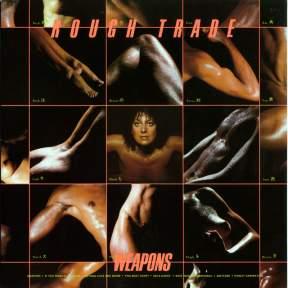
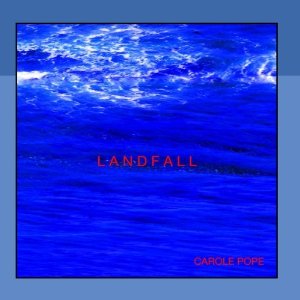
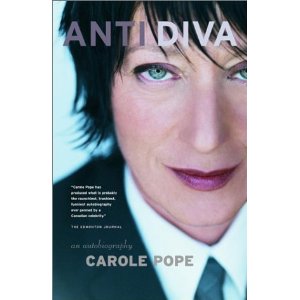
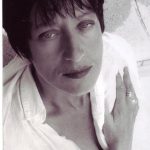
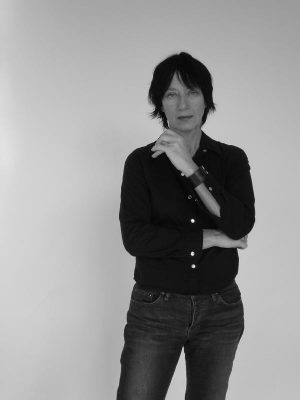

No Comments Yet!
You can be first to comment this post!